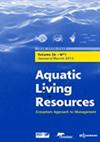Assimilation of shrimp farm sediment by Holothuria scabra: a coupled fatty acid and stable isotope approach
IF 1.5
4区 农林科学
Q3 FISHERIES
引用次数: 9
Abstract
Deposit-feeding sea cucumbers are efficient nutrient recyclers and have the potential to contribute to the limitation of organic matter load in polyculture or integrated aquaculture systems. Assessing how they assimilate organic matter originating from other farmed species is therefore important for the development of such multi-species farming systems. Here, a coupled stable isotope − fatty acid approach was used to characterize the assimilation of organic matter from shrimp (Penaeus stylirostris) farming by Holothuria scabra in an experimental culture system. H. scabra were reared in mesocosms on shrimp farming-originating sediment with and without additional food sources (maize and fish meals). Although fatty acid results did indicate that shrimp-farming sediment was assimilated by holothurids, we found no evidence of maize waste and fish meal contribution to H. scabra organic carbon (no effect on δ13C, no accumulation of meal-specific fatty acids). However, a strong effect of fish meal on H. scabra δ15N was observed, suggesting that this additional food source could represent an alternative source of nitrogen for holothurids. Finally, this study supports the culture of H. scabra as a perspective to reduce sedimentary organic matter excess associated with shrimp farms, and suggest that the addition of selected food sources might contribute to increasing the content in some nitrogen organic compounds in holothurid tissues.藻藻对虾场沉积物的同化作用:脂肪酸和稳定同位素的耦合方法
沉积饲养海参是有效的养分循环者,在混养或综合水产养殖系统中具有限制有机质负荷的潜力。因此,评估它们如何吸收来自其他养殖物种的有机物对于发展这种多物种养殖系统非常重要。本研究采用稳定同位素-脂肪酸耦合方法,研究了在实验培养系统中,糙斑Holothuria scabra对stylirostris对虾(Penaeus stylirostris)养殖中有机物的同化作用。在有或没有额外食物来源(玉米和鱼粉)的情况下,在养殖对虾的沉积物中饲养糙皮糙皮绦虫。虽然脂肪酸的结果确实表明养虾沉积物被holothurids同化,但我们没有发现玉米废料和鱼粉对黄颡鱼有机碳贡献的证据(对δ13C没有影响,没有饲料特异性脂肪酸的积累)。然而,观察到鱼粉对黄颡鱼δ15N有很强的影响,表明这种额外的食物来源可能是holothurids的另一种氮源。最后,本研究支持从养殖角度减少与对虾养殖场相关的沉积有机质过剩,并表明添加特定食物来源可能有助于提高对虾组织中某些含氮有机物的含量。
本文章由计算机程序翻译,如有差异,请以英文原文为准。
求助全文
约1分钟内获得全文
求助全文
来源期刊

Aquatic Living Resources
农林科学-海洋与淡水生物学
CiteScore
2.30
自引率
0.00%
发文量
10
审稿时长
>24 weeks
期刊介绍:
Aquatic Living Resources publishes original research papers, review articles and propective notes dealing with all exploited (i.e. fished or farmed) living resources in marine, brackish and freshwater environments.
Priority is given to ecosystem-based approaches to the study of fishery and aquaculture social-ecological systems, including biological, ecological, economic and social dimensions.
Research on the development of interdisciplinary methods and tools which can usefully support the design, implementation and evaluation of alternative management strategies for fisheries and/or aquaculture systems at different scales is particularly welcome by the journal. This includes the exploration of scenarios and strategies for the conservation of aquatic biodiversity and research relating to the development of integrated assessment approaches aimed at ensuring sustainable and high quality uses of aquatic living resources.
 求助内容:
求助内容: 应助结果提醒方式:
应助结果提醒方式:


